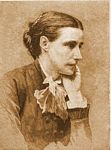
ELIZABETH STUART PHELPS (1844 – 1911) was born in Boston, began summering in Gloucester as a young woman, and eventually built a cottage for herself on Eastern Point. Interestingly, it was Phelps who took Longfellow for his first visit to Norman’s Woe shortly before his death. Phelps’ 1868 story about a tragic fire at the Pemberton Mill in Lawrence, MA, established her reputation as a writer, and also in that year, her novel
The Gates Ajar became a national bestseller. In the 1870’s and 1880’s she wrote a series of novels with feminist and progressive themes.
Old Maid’s Paradise (1879), titled after the name of her cottage, and
Burglars in Paradise (1886) are light-hearted books based on living in Gloucester.
Phelps’ presence on Eastern Point attracted other artists to the area and led to the development of the Rocky Neck artist colony. Between 1885 and 1888, when she married, she vigorously opposed the whistling buoy at Eastern Point known as "Mother Ann’s Cow." "The Stone Woman of Eastern Point" was inspired by an old granite gatepost near an Eastern Point barn that in Phelps’ mind became a fisherman’s wife looking forever to the sea for the return of her man. The poem represents all Gloucester women waiting for their fishermen’s return and may remind readers of Mother Ann and the Fishermen’s Wives Memorial.